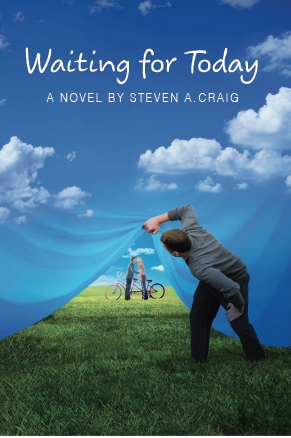It looks like you've stumbled upon a page meant to be read by our code instead of viewed directly. You're probably looking for this page.
Waiting for Today
Humor and religious allusions blend to create an inspiring story of loss and seizing the day.
Steven Craig’s debut updates the Book of Job with a tale of a man facing the loss of everyone he loves. With references ranging from baseball to English literature, and a tone veering from slapstick to melodramatic, there is a pleasing variety to the content of Waiting for Today. However, the religious message occasionally seems shoehorned into a rather sentimental plot.
Jacob and Faith Hartman, a high school English teacher and a florist, live in the upscale Georgetown area of Washington, DC. As the novel opens in 1994, Jacob is in indecisive “ostrich mode” again, this time debating whether to have children. He lost his father in a car crash at age eight and doubts he can bear to become a parent and risk loving someone who could be so easily taken away. Indeed, Jacob will see more than his fair share of suffering: Faith dies in childbirth, and he nearly loses his daughter too. Flashing back to highlights of Jacob and Faith’s relationship and moving forward to see whether Jacob can open himself to love again, the novel’s jumbled collage of memorable scenes emphasizes the importance of finding happiness in the present moment.
For a fairly lightweight novel, the diction is strangely elevated at times: words like “volitionally,” “deleterious,” and “pernicious” bear the mark of a thesaurus, while awkward similes include “like a nightingale robbed of its vocal chords in the midst of Spring.” Dialogue is occasionally stilted and unrealistic, and the back-and-forth chronology creates unnecessary complication rather than adding depth. Some contrived plot points also hint at inauthenticity; for instance, Faith’s hidden talent for piano playing meets Jacob’s previously unknown skill for piano tuning. Readers may be unwilling to overlook such unlikely coincidences.
Where Craig excels is in injecting humor: two restaurant scenes featuring hapless servers create enjoyable physical comedy. One such incident, however, is followed immediately by Faith’s ill-fated delivery; the mood change feels too sudden. Moreover, it then seems peculiar for Jacob to start, Job-like, railing against God, when nothing remotely religious has been mentioned before. The religious allegory, poorly introduced, soon becomes too obvious, especially with characters named Jacob, Faith, and Grace. However, two of the best scenes happen to be conscious literary allusions: a reckless sledding session evokes Edith Wharton’s Ethan Frome, and a classroom reading of a John Donne sonnet pitting faith against reason gives context to Jacob’s anger with God.
The novel might merit an “inspirational fiction” label, although gratuitous profanity and surprisingly explicit love scenes could alienate religious readers. It is more likely to interest fans of romances like those who read Nicholas Sparks. The cover is colorful and whimsical and should attract readers, yet it contrasts the bland Courier font of the interior to create a mixed impression. Given the book’s several extended sections describing baseball games, this work should also appeal to baseball fans. Those who appreciate light, sentimental stories will prize Craig’s encouragement to stop “waiting for today” and start living it instead.
Reviewed by
Rebecca Foster
Disclosure: This article is not an endorsement, but a review. The publisher of this book provided free copies of the book and paid a small fee to have their book reviewed by a professional reviewer. Foreword Reviews and Clarion Reviews make no guarantee that the publisher will receive a positive review. Foreword Magazine, Inc. is disclosing this in accordance with the Federal Trade Commission’s 16 CFR, Part 255.
